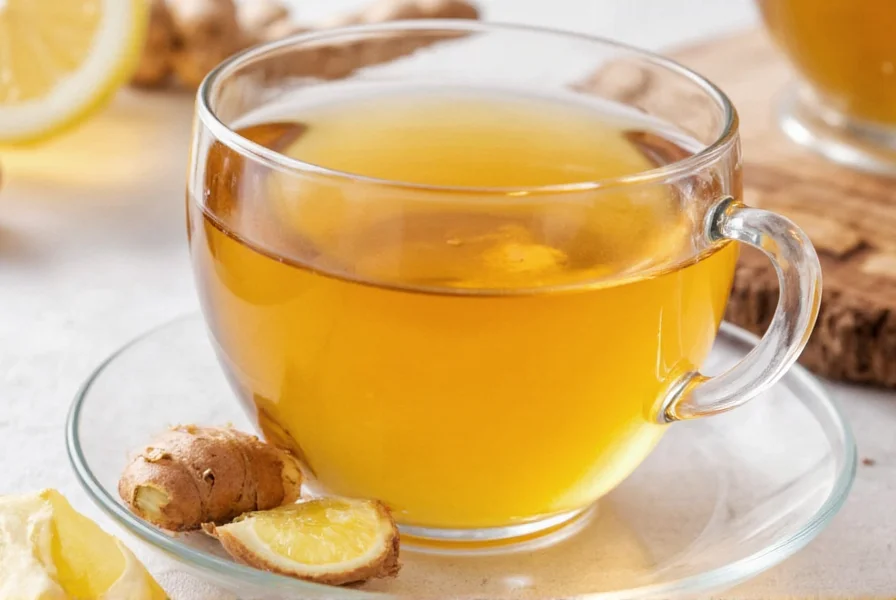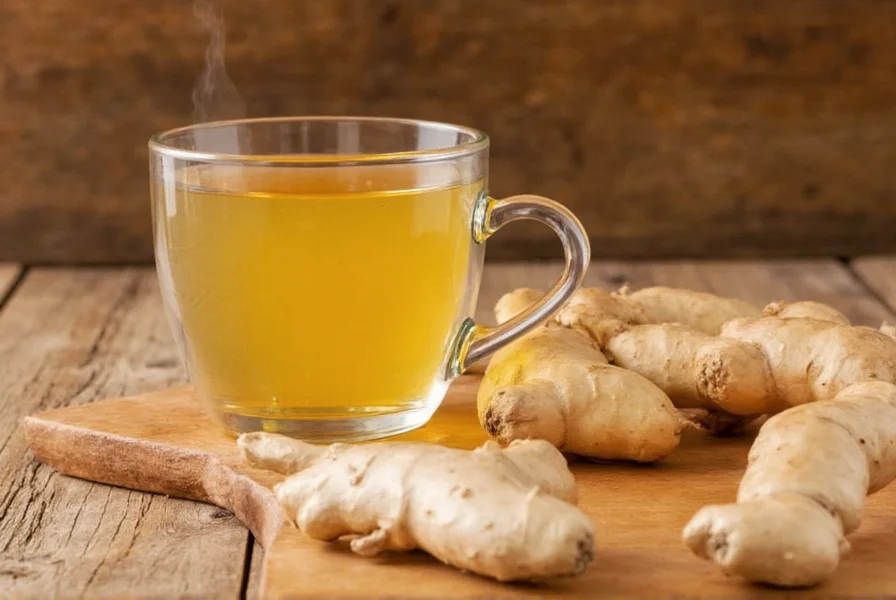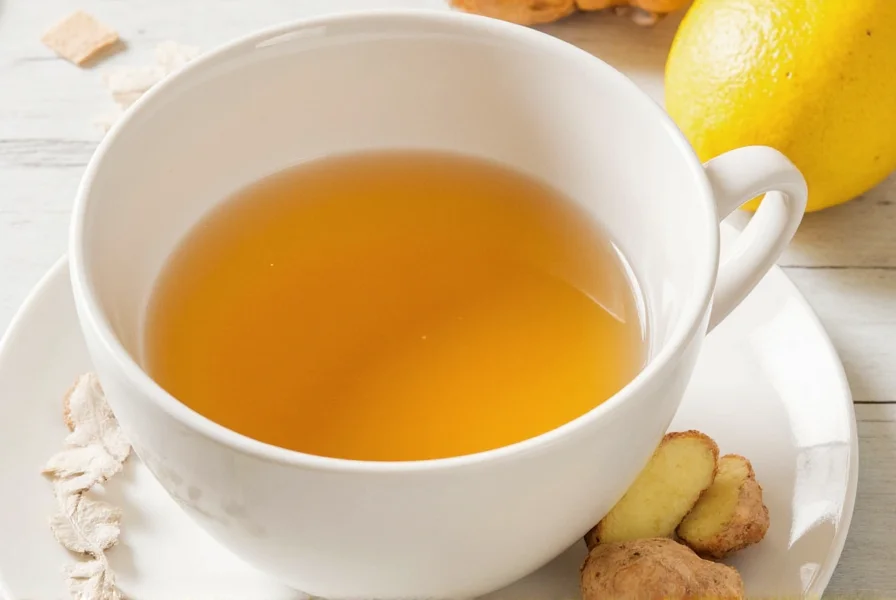For centuries, ginger has been a staple in traditional medicine systems across Asia and the Middle East. Modern research continues to validate many of its traditional uses, particularly when consumed as tea. This comprehensive guide explores the science-backed benefits, optimal preparation methods, and practical applications of ginger tea for everyday wellness.
The Science Behind Ginger's Therapeutic Properties
Ginger (Zingiber officinale) contains over 400 distinct chemical compounds, with gingerols being the most pharmacologically active. These compounds demonstrate significant antioxidant and anti-inflammatory effects in clinical studies. When prepared as tea, water-soluble compounds are efficiently extracted, making it an effective delivery method for ginger's bioactive components.
Unlike many herbal remedies, ginger's effects on nausea and digestion have substantial scientific backing. A 2020 meta-analysis published in Nutrients confirmed ginger's effectiveness for pregnancy-related nausea, postoperative nausea, and chemotherapy-induced nausea. The concentration of active compounds in properly prepared ginger tea reaches therapeutic levels within 10-15 minutes of boiling.

How to Make Ginger Tea: Optimal Preparation Methods
The preparation method significantly impacts the potency and flavor profile of your ginger tea. Here's a professional approach to maximize benefits:
| Preparation Method | Boiling Time | Gingerol Extraction | Flavor Profile |
|---|---|---|---|
| Thinly sliced fresh ginger | 10 minutes | 75-80% | Sharp, spicy, robust |
| Mashed fresh ginger | 8 minutes | 85-90% | Intense, pungent |
| Ginger powder | 5 minutes | 60-65% | Milder, earthy |
| Crystallized ginger | 12 minutes | 50-55% | Sweet, less spicy |
For optimal ginger tea preparation using fresh root:
- Peel 1-2 inches of fresh ginger root using a spoon (preserves more compounds than a peeler)
- Slice thinly against the grain or crush with mortar and pestle
- Bring 2 cups of filtered water to rolling boil
- Add ginger, reduce heat, and simmer uncovered for 10-15 minutes
- Strain and add lemon or honey if desired (honey after cooling to 40°C/104°F to preserve enzymes)
Evidence-Based Health Benefits of Ginger Tea
While traditional medicine attributes numerous benefits to ginger tea, scientific research supports several specific applications:
Digestive Support
Ginger tea stimulates gastric motility and digestive enzyme production. A 2019 study in Food Science & Nutrition demonstrated that regular ginger tea consumption reduced symptoms of functional dyspepsia by 35% compared to placebo. The warming effect helps relax gastrointestinal muscles, making it particularly effective for bloating and indigestion after meals.
Nausea Relief
Multiple clinical trials confirm ginger tea's effectiveness against various forms of nausea. The active compounds interact with serotonin receptors in the digestive tract and brain. For motion sickness, consume 1 cup 30 minutes before travel. For morning sickness during pregnancy, 1 cup 2-3 times daily provides relief without pharmaceutical side effects (consult your healthcare provider first).
Inflammation Reduction
Ginger's anti-inflammatory properties rival some pharmaceutical options. Research in Arthritis showed that participants consuming ginger tea daily for 12 weeks experienced significant reduction in osteoarthritis pain compared to control groups. The effects build over time, making regular consumption more beneficial than occasional use.

Popular Ginger Tea Variations for Specific Needs
Tailoring your ginger tea preparation can address specific wellness goals:
Immune-Boosting Ginger Tea
Add 1 slice turmeric root, 1 crushed clove garlic, and 1/2 lemon during the last 5 minutes of brewing. The combination creates synergistic effects that enhance immune response. Best consumed at first sign of seasonal illness.
Digestive Calming Blend
Combine equal parts ginger and peppermint. The peppermint soothes while ginger stimulates digestion. Ideal after heavy meals or during periods of digestive stress.
Sleep-Inducing Nighttime Tea
Add 1 inch ginger, 1 teaspoon chamomile flowers, and a pinch of cinnamon. The ginger provides gentle warmth without overstimulation, while chamomile promotes relaxation. Avoid adding honey to prevent blood sugar spikes before sleep.
Safety Considerations and Potential Side Effects
Ginger tea is generally safe for most adults when consumed in moderate amounts (up to 4 grams of ginger daily). However, certain populations should exercise caution:
- Pregnant women: Limit to 1 gram daily in the second and third trimesters; consult healthcare provider
- Blood thinning medication users: Ginger may enhance effects of medications like warfarin
- Gallstone sufferers: Ginger may increase bile production, potentially triggering attacks
- Diabetics: Monitor blood sugar as ginger may enhance insulin sensitivity
Excessive consumption (more than 5 grams daily) may cause heartburn, diarrhea, or mouth irritation in sensitive individuals. Always start with small amounts to assess tolerance.
Choosing the Best Ginger for Tea
Not all ginger is equally effective for tea preparation. Consider these selection criteria:
- Freshness indicators: Smooth skin, firm texture, no wrinkles or soft spots
- Origin matters: Nigerian and Indian ginger typically have higher gingerol content than Chinese varieties
- Organic vs conventional: Ginger is often heavily treated with pesticides; organic is preferable for tea
- Storage tips: Keep unpeeled in refrigerator for up to 3 weeks, or freeze for longer storage
For maximum potency, use ginger within one week of purchase. Older ginger develops shogaols during storage, which are less therapeutically beneficial than fresh gingerols.
Integrating Ginger Tea into Your Wellness Routine
Timing your ginger tea consumption can maximize specific benefits:
- Morning: Boosts metabolism and digestion for the day ahead
- Before meals: Enhances digestive enzyme production (consume 20 minutes prior)
- After meals: Aids digestion and reduces bloating (wait 30 minutes after eating)
- Before exercise: May improve circulation and reduce muscle soreness (1 hour prior)
For therapeutic effects, consistency matters more than single large doses. Daily consumption of 1-2 cups provides cumulative benefits that occasional drinking cannot match.
Frequently Asked Questions
How much ginger should I use for one cup of tea?
For a standard 8-ounce cup, use 1/2 to 1 inch of fresh ginger root, sliced or crushed. This provides approximately 1-2 grams of ginger, which delivers therapeutic benefits without being overly intense. Adjust based on personal tolerance and desired strength.
Can I drink ginger tea every day?
Yes, most adults can safely consume ginger tea daily within recommended limits (up to 4 grams of ginger per day). Regular consumption provides cumulative health benefits, particularly for digestion and inflammation. However, take periodic breaks (one week off per month) to maintain effectiveness and prevent potential tolerance development.
What's the difference between fresh ginger and powdered ginger for tea?
Fresh ginger contains higher levels of gingerols, the primary active compounds, while powdered ginger has more shogaols due to the drying process. Fresh ginger produces a more potent, complex flavor and higher therapeutic value (85-90% compound extraction vs 60-65% for powder). Powdered ginger works in a pinch but requires longer steeping and delivers milder effects.
When is the best time to drink ginger tea for digestion?
For optimal digestive benefits, drink ginger tea 20 minutes before meals to stimulate digestive enzyme production, or 30-60 minutes after meals to aid digestion and reduce bloating. Avoid drinking during meals as the strong flavor may interfere with taste perception and the warming effect might be too intense on a full stomach.











 浙公网安备
33010002000092号
浙公网安备
33010002000092号 浙B2-20120091-4
浙B2-20120091-4